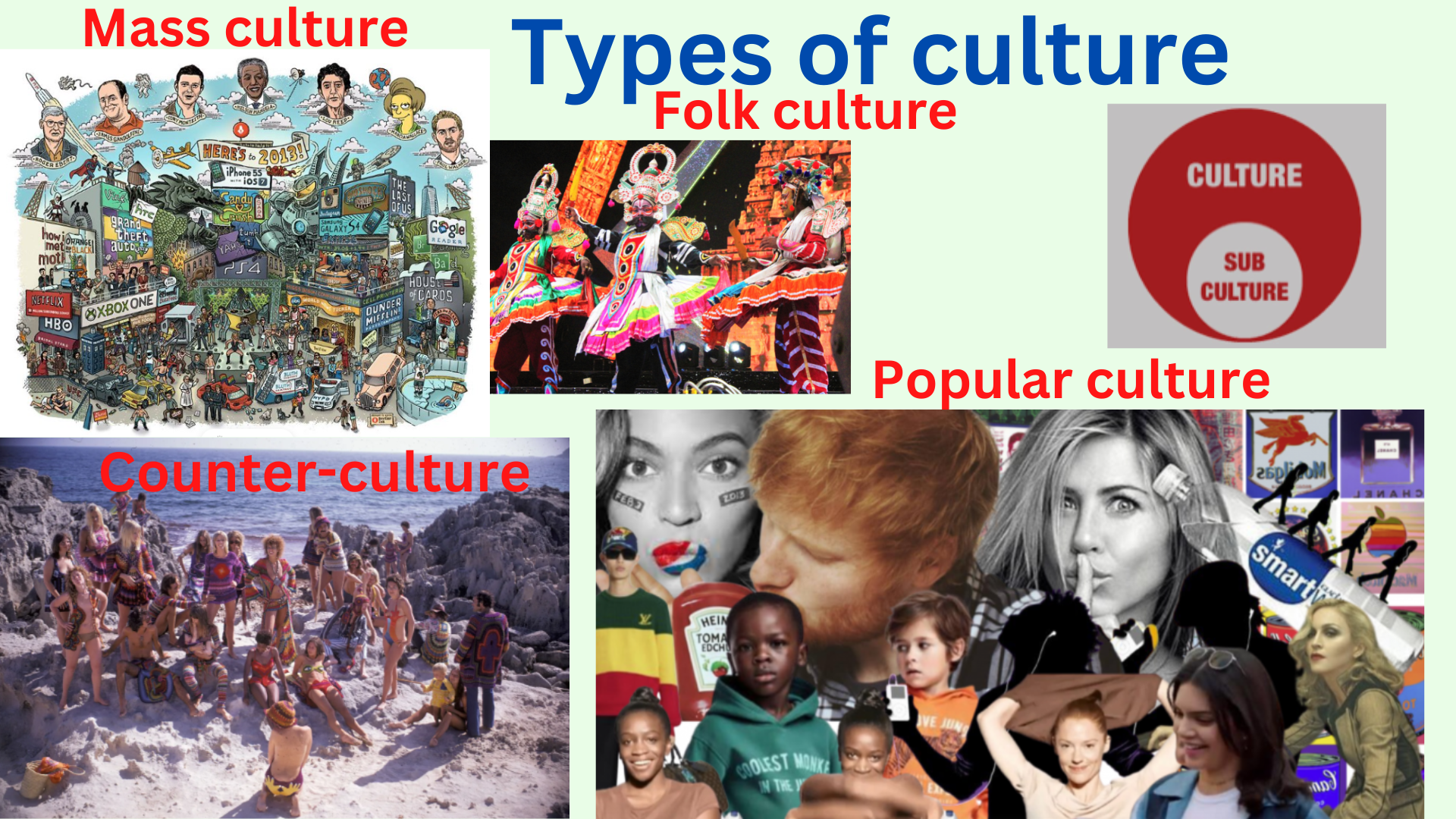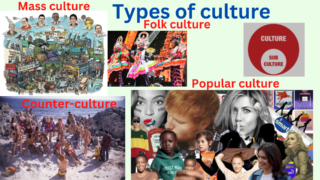
Definition of Culture, Aspects, Types & Characteristics
Culture is a vast concept that encompasses all aspects of our way of life, including our behaviors, philosophies, morals, thoughts, customs, traditions, and various forms of social life, such as religion, politics, and economics. Let’s see diffident scholarly Definition of Culture.
Society and culture are interconnected, and a proper understanding of society is incomplete without understanding its culture. Culture is learned and acquired through socialization, and it is transmitted from one generation to another. It satisfies the needs of society’s members and is adaptive to the changing environment.
Definition of Culture
Sir Edward Tylor defines ” culture as that complex whole which includes knowledge, belief, art, morals, law, custom, and any other capabilities acquired by man, as a member of society.”
J. M. Hetskovits defines– “Culture as the man-made part of the environment”.
Dressler and Willis define culture as the sum total of skills, beliefs, knowledge, and products shared by a number of people and transmitted to their children.

The characteristics of culture include:
- Culture is acquired or learned.
- Culture is transmitted.
- The nature of culture is social.
- Culture is the ideals of society.
- Culture satisfies the needs of the members of the society, hence it is gratifying.
- Culture is proactive or adaptive.
- Culture is a mechanism that creates unity.
- Culture undergoes a process of change.
- Language is a basic characteristic of culture.
- Culture is abstract and highly personal.
- Culture resides in the minds of individuals. That is, it is internalized by individuals.
- Every society has its own culture, and every culture varies from society to society.
Aspects Of Culture
Culture is the shared set of beliefs, values, customs, behaviors, and artifacts that characterize a group or society. Culture is not static, but rather it is constantly evolving and changing. In this post, we will discuss various aspects of culture that help to define and shape it.
Aspects of culture or components of culture
1) Norms
2) Value
3) Symbols
4 )Language
5) Technology
1) Norms:
Norms are the expectations or rules that guide behavior in a society. They are the unwritten rules that people follow to fit in and be accepted in their society.
Norms can be further divided into two types – folkways and mores. Folkways are the everyday norms that people follow, such as using manners when eating or holding a door for someone. Mores are the more serious norms that are enforced by the law or cultural sanctions, such as not committing murder or stealing.
2) Values:
Values are the core beliefs that people hold about what is right and wrong, good and bad, and what is important in life. Values are the driving force behind a society’s norms and behavior.
Some examples of values include freedom, equality, justice, and truth.
3) Symbols:
Symbols are objects or images that represent something else. They are often used to communicate complex ideas or emotions in a simple way. Symbols can be physical objects, such as the American flag, or they can be abstract, such as the concept of justice. Symbols can be used to unite people, such as national flags, or to divide people, such as religious symbols.
4) Language:
Language is a system of communication that enables people to express their thoughts, ideas, and emotions. Language is an important aspect of culture because it allows people to transmit their cultural knowledge and traditions from one generation to the next. It also allows people to communicate with others in their society and to share their experiences and beliefs.
5) Technology:
Technology refers to the tools, machines, and techniques that people use to make their lives easier or more efficient. Technology is an important aspect of culture because it has the power to transform the way people live and work. It can change the way people interact with each other and with the environment, and it can also change the way people view the world.
In conclusion, Understanding these aspects can help us to appreciate the diversity and richness of human societies, and to better understand the forces that shape our beliefs, values, and behavior.
Types of Culture
Culture can be broadly defined as a way of life & that is internalized by an individual and includes both tangible and intangible elements.
According to Ogburn there are two main types of culture which are:
1) material culture and
2) non-material culture.
1) Material Culture-
This includes physical objects created by a society that are used and valued by its members, such as art, architecture, tools, and technology.
2) Non-material Culture
This refers to the intangible aspects of a society, including its values, beliefs, norms, and language.
Five different types of culture
There are also five different types of culture that can be identified:
1) Folk Culture
Refers to the culture of common people, especially those living in pre-industrial societies.Self-created and autonomous, and directly
reflects people’s lives and experiences.
Examples include traditional songs and stories found in rural areas.
2) Mass/Mass Culture
Considered less appropriate than folk culture and is a product of industrial society.
Essentially a product of mass media, including popular films, TV soap operas, and recorded pop music.
3) Popular Culture
This refers to the cultural products and activities that are created and consumed by a large segment of society, such as music, TV programs, pop music, and popular fiction like the Harry Potter series. movies, fashion, sports, and television. this products and activities accepted by a large number of ordinary people.
4) Subculture
Refers to the group-specific cultures of different groups in the same society.
Examples include subcultures of ethnic or religious groups and cultures of people who have settled in foreign countries.
5) Counter culture
Refers to Counter culture that challenge the established culture of society.
Examples include the hippie culture and the culture of organized crime gangs.
FAQ on culture:- संस्कृती म्हणजे काय | QUIZ On Culture In Marathi
